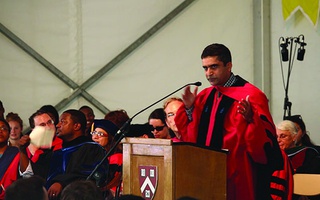{shortcode-1598a1699a2d42b3f9c309a9376a3d2ebcbe5296}
When more than 100 freshmen learn early Thursday morning that Cabot House will be their home for the next three years, they will join a community with lively House spirit, a cod for a mascot, and the next dean of Harvard College at its helm.
In recent memory, no dean of the College has also served as a master of one of Harvard’s upperclassman Houses. When Cabot House Co-Master Rakesh Khurana becomes the College’s top administrator on July 1, however, he will be at the helm of both the Quad House he calls home and Harvard’s flagship school.
While College administrators both inside and outside the House system say that Khurana’s dual role will present him with challenges, these colleagues say that they are confident in the leadership expert’s ability to balance the duties that come with both jobs.
PRESSED FOR TIME
Though the commute may only be a few blocks from the Quad to the Yard, administrators interviewed about Khurana’s appointment largely agree that one of the largest challenges he will face in his new role is time management.
“I’d say that he’s probably going to have to take his energy pills,” Interim Dean of the College Donald H. Pfister said in an interview in February. “I think there’s a lot to balance.”
Prior to coming to his current role in the Dean’s Office, Pfister had served as master of Kirkland House for 18 years, from 1982 to 2000.
As dean of the College, Khurana’s daytime responsibilities will revolve around work in University Hall, the administrative heart of both the College and the Faculty of Arts and Sciences. There, he will likely chair the Administrative Board, the College’s primary disciplinary body, convene committees on College issues, and meet regularly with University and student leaders—just a few of what will be his many administrative responsibilities.
Khurana, who is currently a professor at the Business School and holds an FAS appointment in the Sociology Department, will spend much of his remaining time up Garden Street in the Radcliffe Quadrangle, participating in House activities and fostering House spirit with his co-master and wife Stephanie R. Khurana.
“I think the main challenge is the number of hours in a day,” Dean of Student Life Stephen Lassonde said of Khurana’s upcoming roles. “Being a House master is very demanding, especially at night, and while he continues to do that...he’s going to be in great demand all the time.”
Still, despite what might appear to be increased time constraints on his job as a House master, some administrators suggested that it is primarily Khurana’s work at the Business School that will shift when he becomes dean. Khurana has said that he will give up his teaching responsibilities at the Business School when he takes on the new role.
“It’s my day job that changes more than my master’s job,” Khurana said in sit-down interview in February, several weeks after he was named to the deanship.
“Basically, instead of being across the river, teaching and doing a lot of research, he will be on this side of the river during his day, doing those things,” added Stephanie Khurana in the same sit-down interview.
Eliot House Co-Master Gail A. O’Keefe noted that her husband, Co-Master Douglas A. Melton, is also busy outside of his master’s job but still fulfills his role in the House. Melton serves as co-director of the Harvard Stem Cell Institute and is also a University professor. Both Eliot masters expressed enthusiasm at Khurana’s appointment.
CONFLICTING ROLES
But beyond time constraints, Adams House Co-Master Sean Palfrey ’67 suggested that Khurana will also face the challenge of handling administrative decisions that could involve potential conflicts of interest created by his dual role. He cited financial issues and questions of “what degree of independence House masters should have” as examples.
“There could be times when being the dean of the College would be very difficult at the same time as being a House master,” Palfrey said in an interview in late January, shortly after Khurana’s appointment. “As an administrator, you’re going to be asked to make decisions which may well be unpopular with any of the people that you’re working with.”
Pfister, for his part, noted that chairing the Ad Board could present a conflict of interest for Khurana if any of his students from Cabot were to go before the body. Similarly, Pfister said, Khurana might write a fellowships letter in his capacity as a House master and find himself in the position to review that letter as the College dean. There may also be the appearance of conflict where it does not actually exist, Pfister added.
Still, Pfister and other administrators said they were confident in Khurana’s ability to appropriately address any conflicts that might come up. “It can get murky,” Pfister said. “But he’s very much aware of it, and I know that he will be ethical in every part of this.”
“In terms of conflicts, I think he’s very perceptive and sensitive, and I think he’ll be able to understand when his roles are in conflict and step away,” Lassonde said. “He certainly will have a lot of advice and training from [the Dean’s office] to help him as he approaches decisions where there may be some possible conflicts.”
When Khurana assumes the deanship this summer, he will succeed Pfister, who has been serving as the interim dean since last summer. Evelynn M. Hammonds stepped down from the post last July.
—Staff writer Madeline R. Conway can be reached at mconway@thecrimson.com. Follow her on Twitter @MadelineRConway.
—Staff writer Steven S. Lee can be reached at steven.lee@thecrimson.com. Follow him on Twitter @StevenSJLee.
Read more in College News
Students Clamor for Midterm-Free Housing Day, Administration Prioritizes Academics















